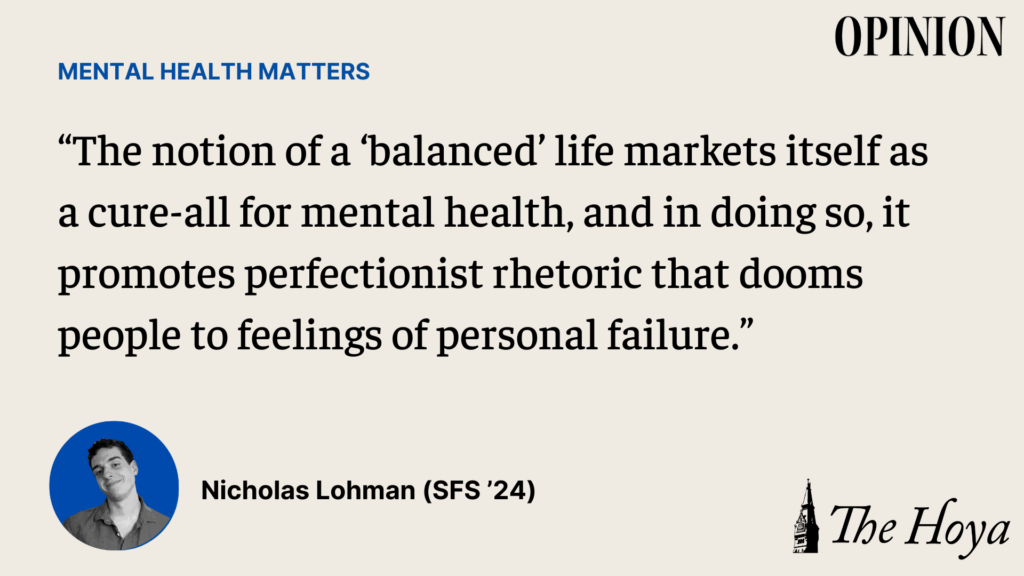What is it about wellness TikTok that raises our stress levels? In theory, these videos should relax users, offering inspirational advice about living a ‘balanced’ life. They lead viewers to believe that 5:30 mornings, daily yoga and meditation, chicken-and-rice dinners, a clean apartment, an impeccable skin care routine and a bedtime before sunset are the doors to mental wellness; unlock them all and daily stress, anxiety, sadness and lethargy will disappear. But there are several issues with this mindset that leave us feeling unsatisfied and often worse.
The notion of a ‘balanced’ life markets itself as a cure-all for mental health, and in doing so, it promotes perfectionist rhetoric that dooms people to feelings of personal failure. In order to improve their mental wellness, Georgetown students must abandon the toxic thinking that ‘balance’ often promotes and pursue a radical mindset shift.
Since the 1950s, neoliberalism has increasingly placed the onus of mental health care on the individual rather than viewing mental health challenges as the result of new social structures. The idea of living a more ‘balanced’ life, which had been employed in medicine since the time of the ancient Greeks, changed accordingly. As people experienced mental distress, they increasingly turned to lifestyle changes they believed would work like the psychiatric drugs beginning to dominate psychological treatment — the idea of a quick fix that ‘balance’ promotes today.
The wellness industry capitalizes on this ‘easy fix’ rhetoric to sell the solutions that humans crave, with its market now estimated at more than $1.5 trillion. For instance, marketing a viral evening routine to Georgetown students sells the faulty yet attractive idea that they can continue to fill their Gcals with classes, internships, extracurriculars, and social events because making space for wind-down time will balance out their anxiety and stress. The problem is that mental health care is not a cozy vibe or a clean aesthetic; this perspective just reifies the viewpoint that good mental health is a supplement one makes to life-as-usual. Georgetown students all know of — or are themselves — the person who cultivates the ‘right’ habits in order to accomplish the most academic, professional and personal growth possible. Yet, those who strive to adopt the ‘best’ habits often seem to be the most mentally drained.
This contradiction is due to the hyper-competitive nature of capitalist society. It’s a race to the top, and those closest to it (those with successful careers, expensive items, and conventional beauty) are supposedly able to bask in society’s rewards for having ‘made it.’ Yet, often forgotten is that the race to the top is simultaneously a race to nowhere. ‘Perfection’ is unattainable by most definitions, and as a result, the pursuit of self-improvement can easily become addictive. This leaves one perpetually unsatisfied and, eventually, anxious, depressed and overall unhappy.
Moreover, according to author and psychologist Thomas Curran at the London School of Economics, globalization has magnified the scope of self-comparison, causing unprecedented levels of ‘chronic’ perfectionism. This problem is heightened at Georgetown, as students receive up-to-the-minute information on their peers’ lives through prolific social media usage. Additionally, Georgetown’s sheer number of high-achieving students and successful alumni leads students to compare themselves to one another more frequently and in relation to sky-high standards. Trying to be ‘balanced’ is simply another way students compete for ‘perfection.’ And for students who have experienced success in myriad settings, poor mental health appears to be the final barrier to living ‘perfectly’ well-rounded lives.
Yet, believing that achieving ‘perfect’ mental health will lead to a ‘perfect’ life is bound to result in a feeling of inadequacy when this standard is inevitably not realized. By admitting that anxiety and stress are natural parts of life, students can learn to observe and accept uncomfortable emotional responses rather than approach them with a sense of alarm that magnifies their effects. True mental health care requires ending the nonstop cycle of self-improvement and admitting that wellness is involved in every decision one makes.
A more helpful version of ‘balance’ entails sacrificing priorities that society deems important in order to create space for mental health to thrive. Research indicates that humans make decisions based on “choice sets” — a limited list of options seen as appropriate within a given context — and often default to the most ‘normal’ or ‘acceptable’ choice. Recognizing this, Georgetown students should reflect upon the habits they default to: chasing after stellar grades, Instagram feeds, internship success, fitness, and mental health, taking note of how these habits feed into toxic perfectionism. They should then take ‘outside the box’ actions that will lead to sustained mental wellness. Examples could include shifting academic priorities away from straight A’s (gasp!) and towards understanding in order to train the mind to avoid the trap of seeking external validation, skipping class readings to take a long nap, deciding to go substance free for a weekend, taking fewer than 15 credits, or sleeping in on weekdays. By practicing radical decision making that defies social pressure, students can reconstruct their choice sets in order to normalize decisions that forfeit ‘perfection’ for mental wellness.
Nicholas Lohman is a Junior in the School of Foreign Service. Mental Health Matters is published every other week.














